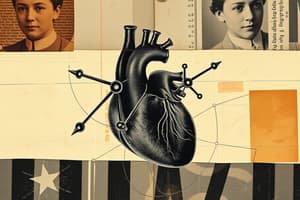Podcast
Questions and Answers
What is the primary indication for using Cardizem (Diltiazem)?
What is the primary indication for using Cardizem (Diltiazem)?
- To treat bacterial infections
- To control hypertension
- To manage diabetes mellitus
- To control ventricular response in rapid A-fib or aflutter (correct)
What is the correct dosage for Cardizem in adult patients with rapid ventricular response in A-Fib?
What is the correct dosage for Cardizem in adult patients with rapid ventricular response in A-Fib?
- 0.35 mg/kg by IVP over 3-5 min (correct)
- 25 mg orally once a day
- 0.10 mg/kg by IV infusion over 30 minutes
- 10 mg/kg by IM injection
Which of the following patients should avoid using Cardizem due to contraindications?
Which of the following patients should avoid using Cardizem due to contraindications?
- A patient with hypertension
- A patient with wide-QRS tachycardia of uncertain origin (correct)
- A patient with migraine headaches
- A patient with osteoarthritis
What is the main action mechanism of Cardizem (Diltiazem)?
What is the main action mechanism of Cardizem (Diltiazem)?
Which of the following is a serious adverse reaction to Cardizem?
Which of the following is a serious adverse reaction to Cardizem?
What is a significant drug interaction to be cautious about when administering Cardizem?
What is a significant drug interaction to be cautious about when administering Cardizem?
Study Notes
Indications for Cardizem (Diltiazem)
- Primarily indicated for the treatment of hypertension and angina.
- Also used for managing rapid ventricular response in patients with atrial fibrillation (A-Fib).
Dosage for A-Fib
- In adult patients experiencing rapid ventricular response in A-Fib, the typical initial dosage of Cardizem is 15 to 20 mg given intravenously over a period of 2 minutes.
- Follow-up doses may be administered after 30 minutes if needed, typically ranging from 25 to 50 mg.
Contraindications for Cardizem
- Patients with severe bradycardia or heart block should avoid using Cardizem.
- Use is contraindicated in individuals with hypotension (systolic blood pressure <90 mmHg).
- Caution in patients with congestive heart failure and those with a history of hypersensitivity to diltiazem or any components in the formulation.
Mechanism of Action
- Cardizem works as a calcium channel blocker, inhibiting calcium influx into cardiac and smooth muscle.
- Results in decreased heart contractility, lowered heart rate, and dilation of coronary arteries, which improves oxygen delivery to the heart.
Serious Adverse Reactions
- Potential serious adverse reactions include heart block, which can lead to hemodynamic instability.
- Other critical reactions may include severe hypotension and acute liver injury.
Significant Drug Interactions
- Caution is advised when administering Cardizem with beta-blockers, as they may enhance cardiac depressant effects and increase the risk of bradycardia and heart block.
- Other drug interactions may involve medications that are metabolized by CYP3A4, leading to increased plasma concentrations of concurrently administered drugs.
Studying That Suits You
Use AI to generate personalized quizzes and flashcards to suit your learning preferences.
Description
Test your knowledge on the dosage and indications of Cardizem, also known as Diltiazem, a calcium channel blocker and Class IV antiarrhythmic medication. Learn about the recommended dosages for rapid ventricular response in atrial fibrillation and atrial flutter, as well as its use as a second-line agent for supraventricular tachycardia (SVT).




